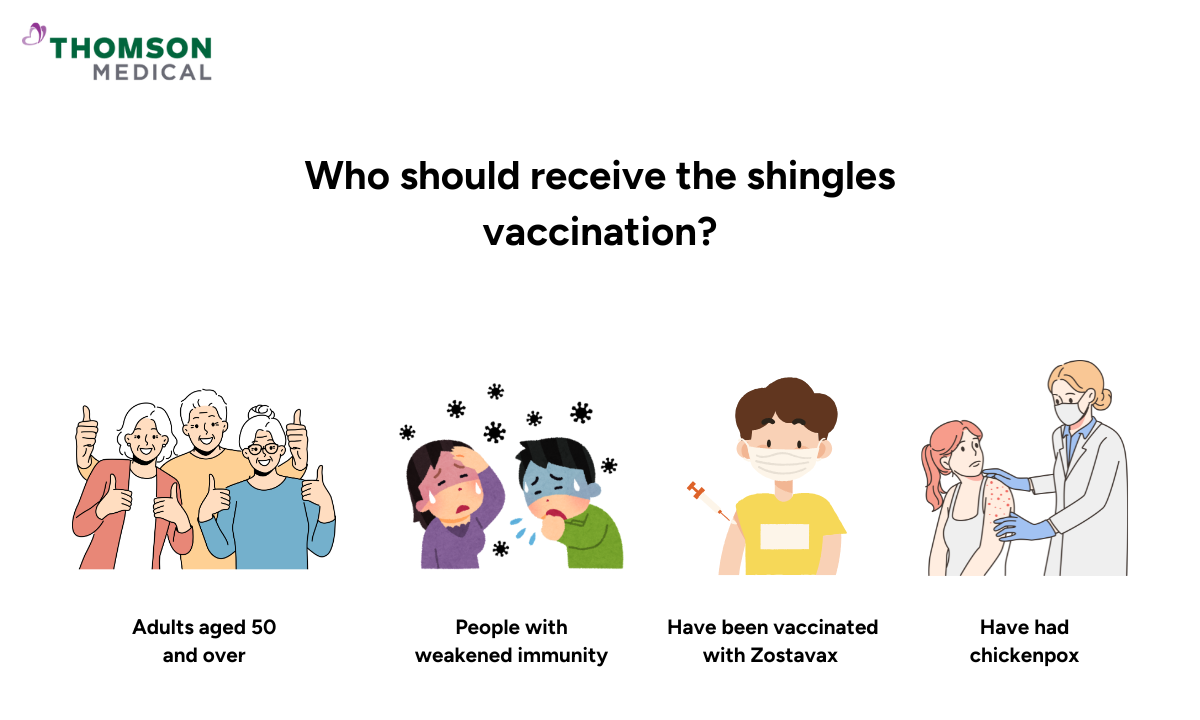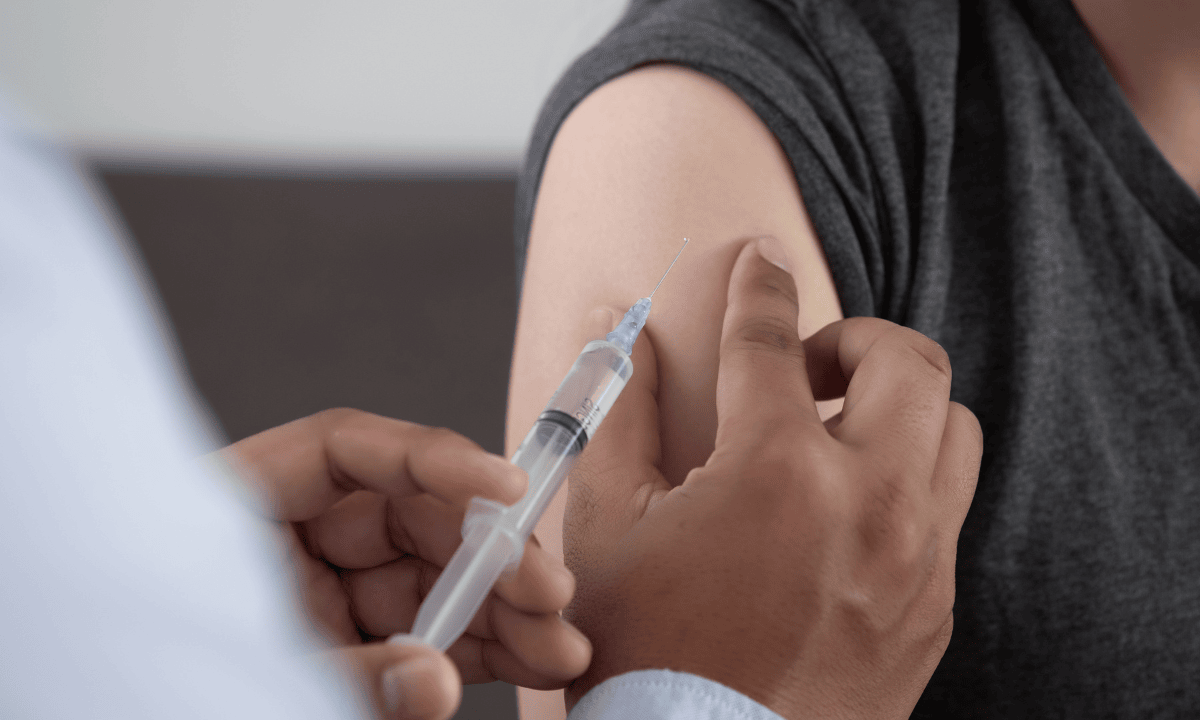What is shingles?
Shingles, also known as herpes zoster, is a viral infection caused by the reactivation of the varicella-zoster virus, the same virus that causes chickenpox. Once you have recovered from chickenpox, the virus remains dormant in the nerve tissue and can reactivate years later, causing shingles.
Shingles can appear anywhere on the body, but it commonly appears as a line of blisters running down one side of the body. The condition is characterised by intense pain, burning sensations, and a shingles rash that develops into fluid-filled blisters. It is most common among older adults and individuals with weakened immune systems.
Although shingles is not usually life-threatening, it can cause complications and transmit the varicella-zoster virus to others, causing chickenpox. To help lower the risk of contracting shingles, a vaccination is a recommended prevention step.
Why is the shingles vaccine important?

The shingles vaccine is important because it’s the only reliable way to reduce your risk of developing this painful condition. It also shortens the infection and reduces the risk of complications from shingles if you get it.
A shingles vaccination is recommended for:
Adults aged 50 and over, as the risk of shingles increases with age.
People with weakened immune systems, including those with HIV/AIDS, cancer, or chronic conditions like diabetes.
Individuals undergoing immunosuppressive treatments, such as chemotherapy or long-term steroid use like prednisone.
Those previously vaccinated with Zostavax.
Anyone who has previously experienced chickenpox.
Additionally, vaccination can also prevent common complications of shingles, such as post-herpetic neuralgia (PHN), which is long-term nerve pain that can last for months or years, even after the rash has cleared.
It can also help prevent other potential complications, such as vision loss (if the eyes are affected), lung infection (pneumonia), skin infection, hearing problems, and brain inflammation (encephalitis).
In Singapore, it is estimated that there are 30,000 new cases of shingles every year and that around 80–85% of adults have had chickenpox in the past. Approximately 20% of individuals who have had chickenpox will develop shingles later in life, particularly after the age of 50.
Who should not get vaccinated?
Although the shingles vaccine is generally safe and effective at preventing the disease, there are some cases where vaccination is impossible. These include:
Those who have experienced a severe allergic reaction to a vaccine in the past.
People who are currently experiencing shingles or receiving shingles treatment.
Those who are currently pregnant.
Individuals experiencing flu-like symptoms, a high fever, or an infection.
You have tested negative for immunity to the varicella-zoster virus, meaning you have never had chickenpox. Therefore, you should get the chickenpox vaccine instead.
For more information on chickenpox and shingles vaccination, request an appointment with Thomson Medical. Our specialists can provide you with further explanations about these conditions and determine whether the shingles vaccination is suitable.
Additionally, if you fall into these categories but must travel to yellow fever areas, see a travel medicine doctor for a medical exemption letter and strict mosquito protection advice.
What types of shingles vaccines are available?
In Singapore, two shingles vaccines are licensed for use, Shingrix and Zostavax. But most clinics now only offer Shingrix, as it is newer and provides better protection than the older vaccine, Zostavax, as well as being suitable for a wider range of individuals.
Shingrix
Shingrix is a recombinant (non-live) vaccine, meaning it does not contain the live varicella-zoster virus. Instead, it uses a piece of the virus's protein to train your immune system to recognise and fight shingles.
Studies show that Shingrix is 90% effective at preventing shingles and its most serious complication, postherpetic neuralgia (PHN), even in adults over 70 and individuals with chronic health conditions.
Zostavax
Zostavax is a live attenuated vaccine, meaning it contains a weakened form of the varicella-zoster virus. Compared to Shingrix, Zostavax is less effective, providing only 50–60% protection, which decreases over time.
Additionally, as it contains a live virus, Zostavax cannot be administered to individuals with compromised immune systems, who are actually the most vulnerable to shingles.
Because of its higher efficacy rate and safety, Shingrix is now the preferred vaccine for most adults and people with weakened immune systems. If you have previously received Zostavax, it is still recommended that you get vaccinated with Shingrix for stronger, longer-lasting protection.

What do I need to do before having the shingles shot?
Before getting your dose of vaccination, there is no special preparation you need to do. However, there are a few important things you should inform your healthcare provider beforehand, which include:
Any allergies you may have
Previous vaccine reactions (if any)
If you are pregnant, planning to become pregnant, or breastfeeding
All medications you are currently taking
If you currently have a fever or active infection
Any history of bleeding disorders
To help ensure the best results, it's recommended that you stay well hydrated and get adequate rest before your appointment. Please don't hesitate to ask your healthcare provider any questions you may have about the vaccination process or what to expect.
How is the shingles vaccine given?
Shingrix is administered as a two-dose series of injections into the upper arm muscle. The second dose should be administered 2–6 months after the first. Once both doses have been completed, no booster doses are required.
Shingrix can be administered even if you have previously had shingles or received the chickenpox vaccine or the older Zostavax vaccine. However, if you have previously received a single dose of Zostavax, you should wait at least eight weeks before receiving your first Shingrix dose.
Shingles vaccine cost in Singapore
The Shingrix shingles vaccine is available in Singapore for adults aged 50 and over and for individuals aged 18 and over with weakened immune systems. It is available at public or private hospitals, polyclinics, private clinics, or CHAS GP clinics.
If you choose a private clinic, the full two-dose course can cost between SGD 375 and 950. However, if you choose to be vaccinated at government clinics, polyclinics, or CHAS GP clinics, the Singaporean government will subsidise the vaccine cost by up to 75%, starting in September 2025.
This means that Singaporeans can expect to pay between SGD 75 and 300 for both injections after subsidies, while permanent residents will pay around SGD 450. Seniors from the Pioneer and Merdeka generations will also receive additional subsidies.
Additionally, from 2026, you will also be able to use your MediSave account to cover any remaining costs after the government subsidy. With these subsidies, the shingles vaccine can be more affordable, which can help reduce the number of new cases of shingles every year.
To find out more about fees and payment options, request an appointment with Thomson Medical. For further information about subsidies and Medisave coverage for the shingles vaccine, please refer to the website of Singapore's Ministry of Health (MOH).
Side effects of shingles vaccines
The shingles vaccine is generally safe and effective at preventing shingles. However, as it works by stimulating the immune system, you may experience some side effects, which typically last for two to three days.
These mild side effects are normal and indicate that your immune system is responding to the vaccine. Here are some common side effects of the shingles vaccine, which include:
Soreness, pain, redness, or swelling at the injection site
Fatigue, abdominal pain, headache, or fever
Some people may also experience tiredness, muscle pain, headaches, shivering, or nausea
However, while rare, some people may experience serious side effects that require immediate medical attention. If you experience any of the following symptoms, contact your doctor or seek emergency care:
Severe allergic reactions (anaphylaxis)
Dizziness or fainting
Persistent pain or swelling
Difficulty breathing
Rapid heartbeat
Itchy rashes that cover the whole body
FAQ
When is the shingles vaccine necessary?
The shingles vaccine is recommended for adults aged 50 and over to help prevent shingles and its potential complications, including long-lasting nerve pain (postherpetic neuralgia).
It is also recommended for individuals aged 18 and over with weakened immune systems, as they are at a higher risk of contracting shingles and experiencing related complications.
How often do you need to get the shingles vaccine?
You only need two doses of the Shingrix vaccine, given 2 to 6 months apart. After completing both doses, no booster doses are required.
What are the first signs of shingles?
Early symptoms of shingles include a tingling, burning sensation, numbness, or itching in a specific area on one side of the body or face.
This is often followed by a painful red rash that develops into fluid-filled blisters. Some people may also experience sensitivity to touch, fever, fatigue, or headache.
Can you still get shingles if you get the vaccine?
Yes, it is still possible to get shingles after being vaccinated, but your risk is much lower. If you do get shingles, the symptoms are usually milder, and you are much less likely to develop serious complications like postherpetic neuralgia.
Is it safe to be around someone with shingles?
Generally, yes. Shingles itself is not contagious, so you cannot catch it from someone else. However, the virus can be passed on to people who have never had chickenpox or the vaccine.
If they come into direct contact with the fluid from shingles blisters, they could develop chickenpox, not shingles. So, if you have never had chickenpox or the vaccine, avoid getting too close to an individual with shingles.
Can I use MediSave for the shingles vaccine?
Yes. Starting in 2026, you can use your MediSave to pay for any remaining costs of the Shingrix vaccine after government subsidies have been applied.
From September 2025, eligible Singaporeans and permanent residents can also receive up to 75% subsidies for the vaccine at CHAS GP clinics, polyclinics, and MOH-funded institutions. Pioneer and Merdeka Generation seniors will also receive additional subsidies.
This information is intended as general guidance only and should not be considered medical advice. To find out more about the shingles vaccine in Singapore and whether it is suitable for you, request an appointment with Thomson Medical.
For more information, contact us:
Thomson Medical 24-Hour Urgent Care Centre (Novena)
- Call: 6350 8812
Notice:
The range of services, vaccinations, and tests may vary. Please contact us directly to enquire about the current availability.
Request an Appointment